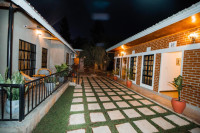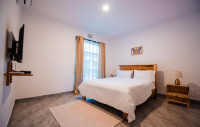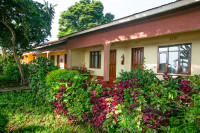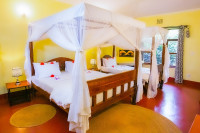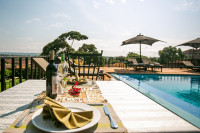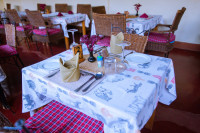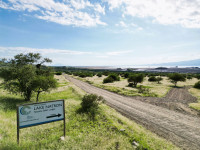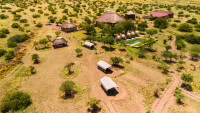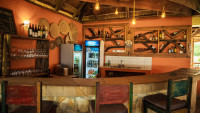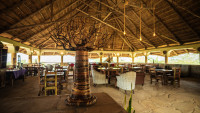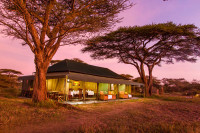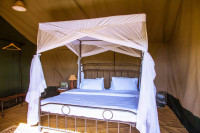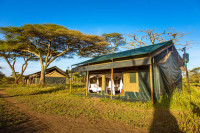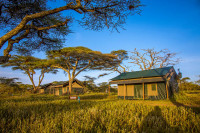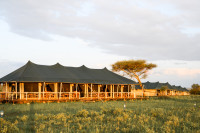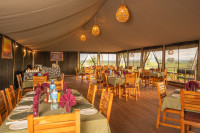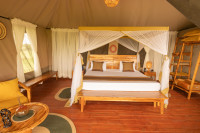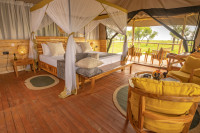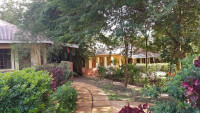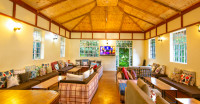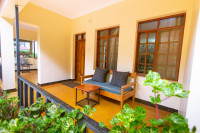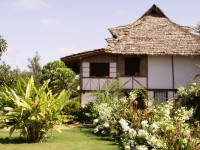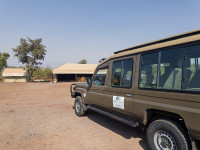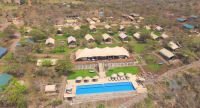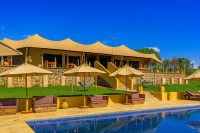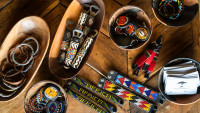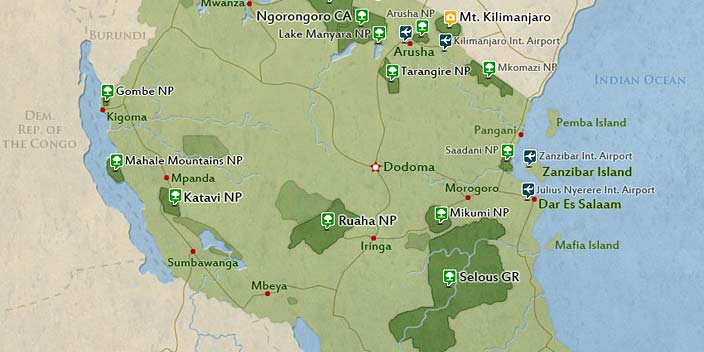
$2,955 pp (USD)
2 travelers on Start dateArrival
Arrival

Day 1
Tanzania Arrival
Tanzania Arrival
Upon arrival at Kilimanjaro International Airport, you will be picked up by our driver. You will then be transferred to the lodge for dinner and your overnight stay. You will have time to review your itinerary as the adventure begins early in the morning.
- Main Destination:
- Arusha (City)
- Accommodation:
- Katiti Lodge
- Meals & Drinks:

Day 2
Tarangire National Park
Tarangire National Park
Giant baobab trees, bush savannah and seasonal marshes add to the wonder of this nature reserve. The Tarangire National Park is considered one of the best places to view elephants up close. The park is also home to buffaloes, zebras and wildebeests, which are always closely followed by a range of predators such as lions. Leopards are seen now and then but cheetahs are rarely spotted. From the open roof of the safari jeep, you will be able to absorb the landscape and watch the animals. In the late afternoon, you will leave the park and head to the lodge for overnight.
- Main Destination:
- Tarangire National Park
- Accommodation:
- Rim View Inn
- Meals & Drinks:

Day 3
Lake Natron
Lake Natron
Just past Mto wa Mbu you leave the asphalted road; along the East African Rift Valley the drive continues on adventurous slopes. The drive leads past Maasai villages and the holy mountain of the Maasai, the Ol Doinyo Lengai. As soon as the Maasai village Ngare Sero comes into sight, it is not far to the lake. The outlet Lake Natron is the home of a remarkable variety of birds, in particular about 2.5 million dwarf flamingos; the lake serves them as a regular breeding ground. The water is strongly saline and the basis of life for unicellular algae and bacteria, which are responsible for the planar red-brown to purple-violet coloring of the lake. The area around Lake Natron is one of the most beautiful and unspoilt regions in Africa. You will make a hike to the lake and then you will visit the nearby waterfalls, a true oasis with awesome waters to swim.
- Main Destination:
- Lake Natron
- Accommodation:
- Africa Safari Lake Natron Lodge
- Meals & Drinks:

Day 4-5
Northern Serengeti National Park
Northern Serengeti National Park
On adventurous slopes, it goes up the Rift Valley into the wide plains of the Serengeti. It is the heart of a vast ecosystem, whose species-rich animal world is unique in the world. Annually, the great migration involves over 1.4 million gnus, almost 300,000 Thomson's gazelles, about 200,000 zebras and several thousand topi's during the rainy seasons to the areas with the greener and lush meadows. With about 3 million larger mammals, the Serengeti is the national park with the richest wildlife worldwide. Around two-thirds make up the above-mentioned animal species, furthermore, the park is the home to many other animal species, such as giraffe, buffalo, hyena, elephant or crocodile. Particularly large is the population of feline predators, about 3000 lions, a good 300 cheetahs and an estimated 400-700 leopards have their hunting ground here.
- Main Destination:
- Northern Serengeti National Park
- Accommodation:
- Heritage Mara Camp
- Meals & Drinks:

Day 6-7
Central Serengeti National Park
Central Serengeti National Park
The entire day is dedicated to game viewing in the Serengeti. The areas that you visit will depend on where the migrating herds are. Predators usually follow closely behind the trekking animals and include lions, leopards (in the acacia trees) and cheetahs. During the short rainy season in November and December, the herds move from the hills in the north to the plains in the south. During the longer rainy season from April to June, they return up north. As the migration is completely dependent on the yearly rainfalls, the location of the herds may vary from year to year but your guide will know where to locate the animals and where to see them best. You will spend the night at Tukaone Serengeti Camp.
- Main Destination:
- Central Serengeti National Park
- Accommodation:
- Tukaone Weavers Camp
- Meals & Drinks:

Day 8
Ngorongoro Crater
Ngorongoro Crater
On this day you will descend over 600 meters into the crater to view wildlife. Supported by a year round water supply and fodder, the Ngorongoro conservation Area supports avast variety of animals, which include herds of wildebeest, zebra, buffalo, eland, warthog, hippo, and giant African elephants. Another big draw card to this picturesque national park is its dense population of predators, which include lions, hyenas, jackals, cheetahs and the ever-elusive leopard, which sometimes requires a trained eye to spot. We will visit Lake Magadi, a large but shallow alkaline lake in the southwestern corner, which is one of the main features of the crater. A large number of flamingos, hippos and other water birds can usually been seen here.
- Main Destination:
- Ngorongoro Crater
- Accommodation:
- Eileen's Trees Inn
- Meals & Drinks:

Day 9
Lake Manyara National Park
Lake Manyara National Park
The park is dominated by the lake of the same name, which attracts large colonies of water birds. Particularly impressive are the pink-colored flamingos, but also many other bird species such as cormorants, pelicans or storks can be observed here. A total of about 400 different bird species live in the park. The park is also famous for its tree climbing lions, which are usually found in the central and open part of the park. During the safari you will also see elephants, zebras, giraffes, buffaloes, hippos and many other animal species. In the afternoon you leave the national park you will head to the lodge.
- Main Destination:
- Lake Manyara National Park
- Accommodation:
- Africa Safari Manyara Escarpment Camp
- Meals & Drinks:

Day 10
Traditional Village Maasai Experience - Arusha/JRO
Traditional Village Maasai Experience - Arusha/JRO
On the last day, you'll head to Mto wa Mbu. You will be able to discover the traditional life of the Maasai, their culture, their traditions and visit their bomas (grouping of huts of an extended family). On arrival at the village, expect to be greeted in the traditional manner: plenty of singing and dancing, with participation very much encouraged! There is then the opportunity to learn about some of the customary practices such as fire-making and beadwork. You may also get the chance to meet and speak to villagers in their homes—questions are very welcome and your guide will happily interpret if needed. During your visit, there is also the opportunity to purchase handmade leather and beadwork from the villagers. Once your time in the village has come to an end, you will head back to Arusha/JRO.
- Main Destination:
- Mto Wa Mbu (Town)
- Accommodation:
- No accommodation (End of tour)
- Meals & Drinks:


